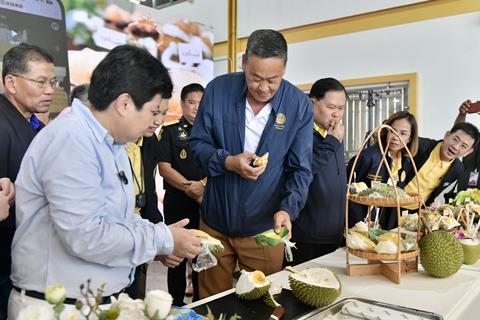Thai government addresses cold-storage prices and labour shortages to boost durian exports

During a recent visit to Chanthaburi, Thai Prime Minister Srettha Thavisin announced the Thai government would support growers to reach an 8 per cent increase in durian exports this year. The increase is set to produce a total revenue of Bt130bn (US$3.51bn) up from Bt120bn (US$3.24bn) in 2023, according to government data.
In a post on his X account, Thavisin said he expects the eastern province, which is known for its high-quality durians, to contribute heavily to the target.
According a report from the Bangkok Post, Thavisin said in order to support growers to reach targets, the Ministry of Agriculture and Cooperatives would encourage durian exporters to comply with Good Agricultural Practice (GAP) standards and develop better varieties. He also said the Ministry of Commerce would address shortages and high prices of cold-storage containers and the Ministry of Labour would oversee the management of migrant workers to accommodate harvest season demand.
Prime Minister Thavisin and deputy agriculture minister Chaiya Promma met with local durian growers in the Nuanthongchan orchard in Khlung district. The Bangkok Post reported the growers asked for drought, pest and labour problems to be addressed. Thavisin said the government would investigate the concerns and promote durian to meet the expected increase in demand.
In addition, to protect Thailand’s reputation as the ‘king of fruits’, the publication said Thavisin had told officials to only harvest ripe durians.
The push for growth comes amidst increases in demand from China in recent years. The market’s imports saw an increase of 69 per cent in 2023 to 1.4m tonnes according to data from China’s General Administration of Customs. Despite its durian exports to China increasing, Thailand lost the near-market monopoly in 2023 as exports from Vietnam dramatically increased following a new market access agreement in 2021.



